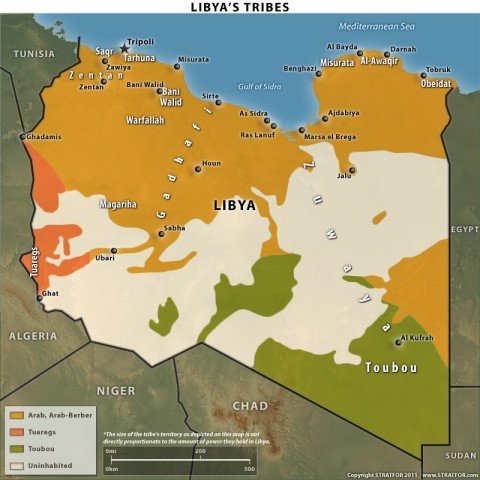by Seth Kaplan | Mar 13, 2012 | Conflict and security, Economics and development, Middle East and North Africa

Last week, 3,000 militia and tribal leaders from eastern Libya announced unilateral plans to begin establishing their own autonomous government. They demanded a return to the loose federation that existed before Col. Muammar el-Qaddafi came to power in 1969.
Predictably, the leaders of the National Transitional Council (NTC) in Tripoli rejected these calls. Mustafa Abdel Jalil, head of the National Transitional Council, even claimed that they were inspired by elements loyal to Gaddafi’s old regime.
This is a mistake. Although Libya would in an ideal world be just fine with a unitary government built around a single national assembly, it is more likely to create a robust state that can meet the needs of its people if it empowers its regions. (more…)
by Alistair Burnett | May 12, 2011 | Conflict and security, Middle East and North Africa
I’ve done a piece for YaleGlobal about the implications for NATO of its operation in Libya
With Operation Unified Protector in Libya, NATO enters war for the third time in its history. And like its first-ever conflict with Yugoslavia in 1999, the alliance is anything but unified. But gone to war it has, carrying out air strikes against forces loyal to Colonel Muammar Gaddafi and more than 100 sorties on most days. The half-hearted nature of the intervention can be seen as a glass half full or half empty for the alliance. But over time the cherry-picking approach of the members could reduce it into irrelevance … Read more
by Alistair Burnett | Apr 7, 2011 | Africa, Conflict and security, Global system, Middle East and North Africa
I’ve posted a piece on the BBC Editors’ Blog about Libya, Ivory Coast and humanitarian intervention.
Since the foreign military intervention began in Libya in early March, The World Tonight has been airing the debate over why action is being taken in Libya and not other countries, such as Ivory Coast.
Over the past decade, we have covered the waxing, in Sierra Leone and Kosovo, of so-called humanitarian or liberal intervention, and its waning in the wake of the Iraq invasion in 2003. It is never a simple case of the international community intervening to protect civilians who are victims of repression from their own governments. If it were, we would have seen foreign forces going into such countries as Sri Lanka or Burma as well as Sierra Leone and former Yugoslavia.
Read more
by Mark Weston | Apr 5, 2011 | Africa, Conflict and security
This piece from yesterday’s Africa Review contains much that is spurious. That coalition forces are ‘taking their lead from the US,’ that Libya will become ‘a basket country’ after Gaddafi goes, that African leaders see Gaddafi as a ‘benevolent godfather,’ and that in the Ivory Coast there is ‘little difference’ between Gbagbo and Ouattara are all at the very least arguable.
But these claims pale into insignificance compared with the article’s overarching point, which is that the West wants to remove Gaddafi because he is a ‘dangerous African likely to cause a united front against neo-colonialism in Africa.’ According to the Africa Review, the kindly dictator ‘identified himself with sub-Saharan Africa, championing a united Africa and showing the continent how if they formulated a collective vision, they would be able to stand on their own feet.’
The basis for this claim is unclear, for when one thinks of Gaddafi and sub-Saharan Africa, unity and self-reliance are very far from the first things that spring to mind. Was Gaddafi championing a united Africa when he armed Charles Taylor in Liberia and Foday Sankoh in Sierra Leone, enabling them to kill tens of thousands of sub-Saharan Africans and maim, rape and torture many more (even Taylor’s defence lawyer at the Hague has asked why Gaddafi is not in the dock)? Was he formulating a collective vision when he sent Libyan troops to help the mad cannibal Idi Amin crush a popular uprising, or when he gave Amin arms to massacre sub-Saharan Africans in northern Uganda? Was he helping Africans stand on their own feet when he sent weapons to a rebel leader in the Democratic Republic of Congo who is now on trial for war crimes? The list goes on and on; with friends like these, as sub-Saharan Africans reading the Africa Review must surely be asking themselves as they splutter over this morning’s cornflakes, who needs enemies?
by Mark Weston | Apr 1, 2011 | Africa, Conflict and security
Last week, a pro-Gaddafi protest in predominantly-Muslim Guinea was banned. This week, a similar event in Niger has been outlawed, with the head of the apparently moderate Islamic Association of Niger describing the attacks as a ‘crusade against the Islamic world.’
Al Qaeda in the Islamic Maghreb – the terrorist organisation’s West African branch – is already gaining strength thanks to ransom payments it has received in return for releasing Western hostages. There must be a risk that what is happening in Libya will push new recruits into its arms.

